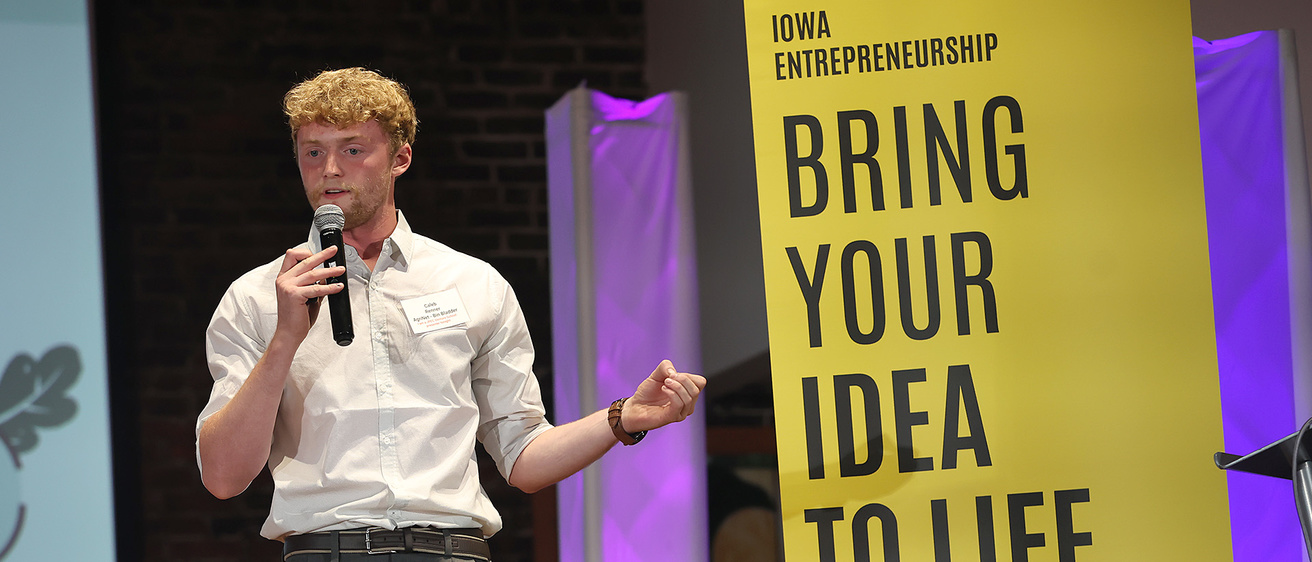Many farmers find inspiration from the hum of their combines during harvest. Caleb Renner's agricultural innovation idea grew inside a grain bin among the towering walls of golden kernels of corn.
“The idea (for AgriNet) took fruition while I was with my grandpa,” said Renner, a fifth-generation farmer. “We were inhaling corn dust and working around this dangerous bin sweep. You have a lot of time to sit and wait between loads. I thought there had to be a better way to do this.”
Inside the bin, Renner was bored. There was no cellular phone connection, so his many thoughts produced a noteworthy idea. That epiphany was aided by the sight of his grandfather’s weathered hands — one was missing three fingers from the type of accident Renner hopes to prevent.
From rural Klemme, Iowa, Renner created AgriNet, a safe alternative to grain bin sweeps that saves farmers their limbs and lives. AgriNet is a parachute-like device that facilities the drying and moving of crops inside a bin without human interaction.
He realized that his concept could transform the agricultural community, but first Renner needed guidance to bring his vision to life. That's when he discovered the University of Iowa John Pappajohn Entrepreneurial Center (Iowa JPEC) and its Venture School — exactly the support system he was looking for to turn his innovative dreams into reality.
“Without a shadow of a doubt, the most beneficial thing I picked up from Venture School was learning how to do customer discovery,” said Renner, who attended the Mason City cohort. “I wouldn’t have any idea how to market this thing or how to price it if it wasn’t through customer discovery. I learned my product is viable and there is a place for it in the market. Beforehand, I thought farmers would like this, but I had no idea if farmers would want this.”
Renner graduated from Garner-Hayfield-Ventura High School in 2020. He took ag classes in community college but is now focused on obtaining a general associate’s degree.
“I don’t need an ag degree to farm,” Renner said. “I want to get a degree in something unrelated to ag. The thing about farming is you always want to have something else you are doing that will lessen the blow if the markets crash. If this venture takes off, that would be my primary job and I would farm on the side. The money I make from my business would help the farm.”
AgriNet has come to life quickly. In the first eight months, Renner has talked to lawyers, engineers, financial advisors, other ag innovation founders, professors, and farmers. He has done more than 100 in-person customer interviews and pivoted nearly 15 times.
“That is the nature of ag equipment,” Renner said. “It is a constant evolving industry and you either adapt or you die. I’m receptive to criticism and pivoting. I have no ego or pride in making sure it’s my idea — I know if I operate that way, I will never start a business.”
Prior to Venture School, Renner had his idea pre-patented. He placed third and won $6,000 at Venture School Statewide Launch Day on June 13 as part of EntreFest in Cedar Rapids.
“I’m more than excited about the money I won,” Renner said. “That will be the difference between feeling good about moving forward on a full-scale protype.”
This is the first step in Renner’s entrepreneurial journey, and he hopes to add more ag safety products to his company, Renner Ag Solutions.
Who knows? He might even make a return to Venture School in the future.
“Venture School has the tools and people who will get you in contact with a myriad of resources that will help you move from concept to solution,” Renner said. “I would not have gotten further than thinking this was a cool idea if it wasn’t for Venture School.”
